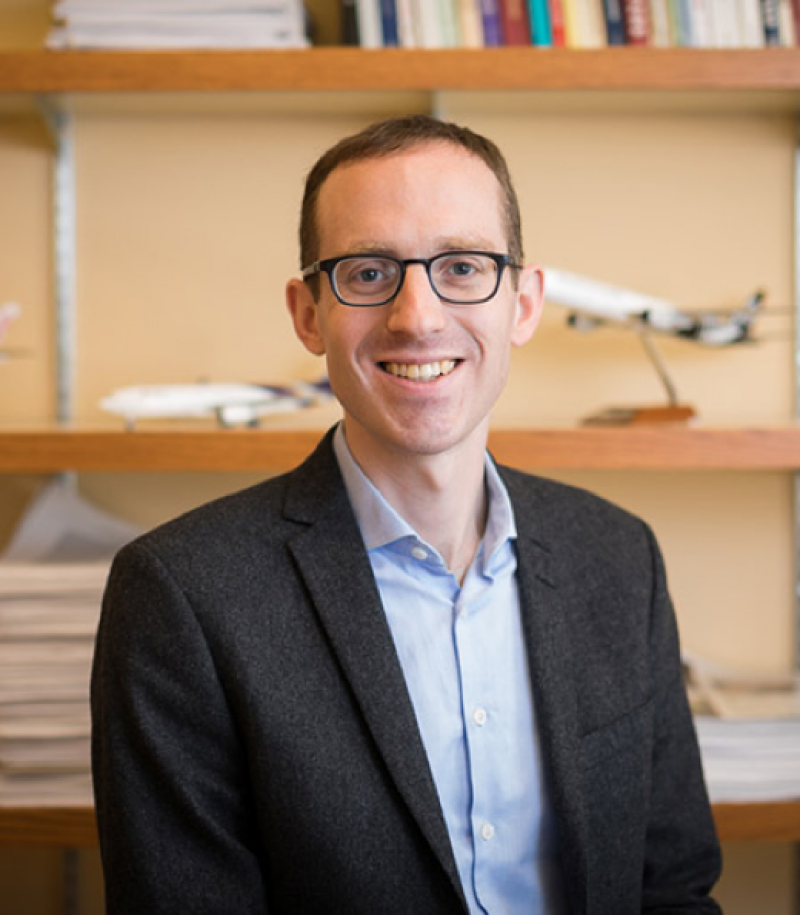
Stories

Adam Levine (Photo: Cornell University)
How to Build Civic Relationships
A conversation with research4impact founder Adam Levine on building relationships between scientists and practitioners to solve our biggest challenges
Adam Levine is a civic matchmaker. As Associate Professor of Government at Cornell University, he studies the impact of political communications, organizations, and social variables on people’s decisions to engage in civic life. In 2017, he co-founded research4impact with fellow political scientists Donald Green and Jake Bowers to connect social scientists who study how change happens with policymakers and organizers working on the ground to confront issues like poverty, climate change, and low voter engagement. Underlying research4impact’s work is a new evidence-based model for how to build relationships between people with diverse forms of expertise.
Adam sees successful relationship-building as central to our collective ability to tackle the big challenges of our time. Through research4impact, he imagines getting closer to, “A world in which people with diverse forms of expertise seamlessly learn from each other, particularly those working to understand and solve complex social problems.”
The Rita Allen Foundation supports research4impact’s efforts to promote a culture of evidence-based decision-making and collaboration, and we also count Adam as a thought partner in our work to strengthen connections between science and society—including through the Civic Science Fellows program. In the conversation that follows, we discuss what it takes to build mutual trust and understanding, how to overcome barriers to collaboration, and what will inspire new generations to seek connection.
—Elizabeth Good Christopherson
President and Chief Executive Officer
Rita Allen Foundation
What led you to realize the importance of connecting researchers and practitioners?
Civic relationships are an essential feature of democracy—they entail people with diverse knowledge, experiences, and identities working together to understand and solve problems.
Relationships between researchers and practitioners are one key example. Efforts to solve the most complex, thorny problems we face—how to address climate change, how to reduce prejudice, how to sustain and grow democratic norms, how to reduce poverty—can benefit immensely from the use of scientific evidence. When researchers and practitioners interact, they share knowledge about what evidence already exists, what still needs to be collected, and how best to do it.
Through these relationships, both groups can also practice techniques for developing mutual understanding, respect, and trust, all of which are fundamental habits of democratic citizenship.
What have you learned from research4impact’s efforts to build trusted relationships across different communities of practice?
Conversations about connecting researchers and practitioners often focus on the information that is being shared—what’s being said and by whom. Concerns about trustworthiness often come up for people working on sensitive and controversial topics. For instance, practitioners working on reproductive rights in the United States want to be certain the researchers they engage with and share details about strategy with are trustworthy.
In addition one of the big things I’ve learned is that researchers and practitioners also care about what the experience of interacting with the other person will be like. This often shows up in two types of concerns. One is about whether the other person will be engaging during the conversation or not. Will the other person value the knowledge I bring to the table? Will the other person be responsive to the concerns that I have?
“Civic relationships are an essential feature of democracy—they entail people with diverse knowledge, experiences, and identities working together to understand and solve problems.”
Researchers who are trustworthy but dismissive do not motivate practitioners to want to connect. What I find in my research is that there are ways that researchers can signal in advance that they will be engaging.
The second set of concerns relates to starting a conversation. Many researchers and practitioners have limited experience talking with each other, and they don’t have a script for how to even begin a conversation. This is a big barrier, and it prevents people from reaching out in the first place. That’s why matchmaking is needed.
Through coaching on signaling and through matchmaking, research4impact has created institutional and interpersonal solutions to help relieve both of these concerns, all before an initial connection even happens. Going forward, as the evidence base for connecting research and practice grows, we still have much to learn about the steps that come next: the best ways to interact during the relationship and also what happens afterward. I’m excited about the work that I and many others are doing to build this evidence base.
Surveys indicate that overall, scientists are seen as trustworthy and serving the greater public good. However, we see many cases where science fails to sway public decision-making. What does your research tell us about how to connect science and society more effectively?
Although scientists are largely seen as competent and trustworthy, they aren’t seen as particularly warm, and many non-scientists believe that scientists feel superior to others. These are huge barriers when trying to initiate new connections, especially from the perspective of practitioners.
That’s why a key part of our model is direct outreach to practitioners. We invite them to tell us about challenges in their work in which they think research might be helpful, and then offer to match them with a researcher for a short, high-impact conversation. Many practitioners are pretty surprised that we do this—they’ve never been approached in this way. But we learned early on that they respond. The demand truly exists. And when a practitioner initiates a conversation like this, it begins on their terms.
“Many researchers and practitioners have limited experience talking with each other, and they don’t have a script for how to even begin a conversation. That’s why matchmaking is needed.”
We also developed a new matchmaking methodology, which is based on research showing how to create successful teams of people with diverse forms of knowledge.
So that’s our model—direct outreach, hands-on matchmaking, and leveraging the psychology of relationship-building.
As society grapples with distrust of news, politicians, and increasingly members of other political parties, what gives you hope about our collective capacity to increase trust and shared problem-solving?
What I’ve seen in my work is many, many situations in which people are given the opportunity to have a genuine conversation with others—a conversation that entails asking questions, responding directly to answers, being affirming, identifying shared values, eliciting concerns, and so on—and they are both excited and grateful. I’m optimistic because I think many people are craving precisely these kinds of conversations.
Yet here’s the rub—such conversations take more work to set up, and more effort to engage in, than just clicking, liking, and watching others on a screen. So we need to support the organizations that are actively working to create the spaces that initiate such conversations. We need to give people practice developing core democratic habits of how to interact with diverse people.
How does your work at research4impact inform how you teach? Are you seeing greater cross-disciplinary partnerships in academia?
It definitely affects my teaching, both explicitly and implicitly.
Explicitly, in my undergraduate class on campaigns, we talk a lot about organizing. When people think of campaign participation, what often comes to mind is voting, polls, social media, and money. That’s what the news media covers. Yet in my class we talk a lot about organizing as well, which is the hard work associated with staffing field offices, canvassing, phone banking, and so on that often doesn’t make the news and, quite frankly, may not give people the emotional high they might be craving. Relationship-building is a key part of organizing.
Implicitly, my research4impact work informs my teaching as well. Students pay a lot of attention to how faculty behave in the classroom, and it rubs off on them. My students see me get excited about the use of scientific evidence to evaluate and debunk claims. They see me reach for scientific evidence when answering their questions. They also see me frequently eliciting their questions and reactions, and thanking them for asking questions and sharing relevant examples.
The upshot, I hope, is that students leave my classes with a heightened sense of the value of scientific evidence, and also with a greater idea of what it looks like to engage with others in a way that makes them comfortable sharing what they know and raising questions and concerns.
What else needs to be done to foster greater collaboration and shared learning?
I see great interest among researchers in interacting with a diverse set of practitioners. We just need to make it easier. Some researchers want to have conversations with practitioners about their experiences, some want to talk about relevant research findings, and some want to partner on a project. I’m also seeing an increasing number of young researchers who are planning to earn their Ph.D. and then go work outside academia.
“We need to give people practice developing core democratic habits of how to interact with diverse people.”
On the university side, I see many universities increasingly focused on public engagement. In practice that often translates into mostly op-eds and other kinds of mass communication. Those are absolutely important, but I’m also seeing that the types of decentralized, one-on-one interactions we’re fostering at research4impact are important and can have an immediate, large impact on how scientific evidence helps solve problems.
Any other thoughts you want to share?
This is an exciting time for those who are actively working to bridge research and practice, as well as build an evidence base on the best ways to do it. I’m really looking forward to continuing to connect with others working in this space.